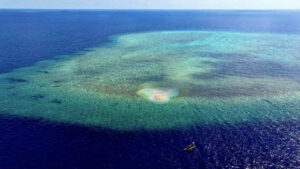PHL to keep ‘strategic’ presence at Sabina Shoal
THE PHILIPPINES will go beyond ship deployment in keeping a “strategic” presence in Sabina Shoal, a maritime council said on Monday after the pullout of the country’s largest coast guard vessel from the disputed atoll.

By Kyle Aristophere T. Atienza, Reporter
THE PHILIPPINES will go beyond ship deployment in keeping a “strategic” presence in Sabina Shoal, a maritime council said on Monday after the pullout of the country’s largest coast guard vessel from the disputed atoll.
“The President’s directive is to maintain our presence in Escoda Shoal,” National Maritime Council spokesperson Alexander Lopez told reporters at the presidential palace in mixed English and Filipino.
“When we say presence, strategic presence, not just physical presence,” he added. “I just want to make clear that our presence is not limited to sending a single ship.”
Mr. Lopez said the pullout of the 97-meter BRP Teresa Magbanua five months after its deployment to Sabina should not be a cause for concern as the government uses other measures to monitor the South China Sea feature that he said is as big as the cities of Caloocan, Navotas, Malabon, and Manila combined.
“Even if Teresa Magbanua left, it did not diminish our presence in the area because we have other ways to monitor,” he said, citing the deployment of planes and technical surveillance capabilities.
“We are also asking for help from our allies on how to go about this technical coverage,” he added.
Mr. Lopez said the Philippine Coast Guard (PCG) had already sent a replacement for its largest ship after it left Sabina Shoal on Sept. 14.
The council also said the ship needed to undergo repairs and that some of its crew needed to address their medical needs. The repositioning would also give the ship’s crew a furlough so they could have a reunion with their loved ones, it added.
BRP Teresa Magbanua was deployed in mid-April amid reports that Beijing was dumping the atoll with dead corals to alter its elevation.
There have been collisions of Chinese and Philippine vessels since last month near Sabina, which lies 140 kilometers off the Philippine westernmost island of Palawan.
NOT LOST TO CHINA
PCG spokesman for the West Philippine Sea Jay Tristan Tarriela said separately on Monday that the pullout of the Philippine vessel did not mean that the country had lost Sabina Shoal to China.
“As far as the Philippine Coast Guard is concerned, we have not lost anything,” he said at a news conference.
“Escoda Shoal, no matter how many instances we intend to go there, we will be able to patrol and deploy our vessel,” he added.
He said despite China’s presence, Philippine vessels can still go to Sabina because it has many entry points unlike Scarborough Shoal, which has only one entrance.
Beijing has effectively controlled Scarborough, which also falls within Manila’s exclusive economic zone (EEZ) but is also claimed by several other countries, in 2012 after maintaining constant coast guard presence there, according to the Asia Maritime Transparency Initiative.
“Bajo de Masinloc only has one single entrance and that is the southeast entrance of the lagoon in Bajo de Masinloc,” he said.
“Escoda Shoal is composed of two lagoons on the west side and eastern side,” he added. “Each lagoon has different areas where you can pass through.”
China claims the South China Sea almost in its entirety including within the Philippine EEZ, rejecting an international ruling that its assertions based on a 1940s map has no legal basis.
Sabina has been a staging ground for Philippine resupply missions to Second Thomas Shoal, in which Manila grounded a Navy vessel in 1999 to serve as an outpost for Filipino troops.
Manila and Beijing came up with a resupply deal during a so-called bilateral consultation mechanism (BCM) in July following a June 17 standoff in which Chinese forces threatened Filipino troops delivering supplies to the Navy outpost, using bladed weapons.
Mr. Lopez, speaking to Palace reporters, reiterated that the pullout of Magbanua was not a capitulation to previous Chinese demands.
“We did not withdraw, and this was not the agreement during the last BCM. People might think we gave in, but in fact, we didn’t,” he said in mixed English and Filipino.
“We stood our ground during the meeting in Beijing and our Department of Foreign Affairs stated that our presence will be maintained at the shoal, so it’s not a withdrawal.”
Mr. Tarriela said Chinese vessels had successfully blocked previous resupply missions of Philippine ships in Sabina Shoal because China already knew that BRP Teresa Magbanua was the destination.
“But right now, there is no reason for us to be blocked. We can go to Escoda Shoal with such a total area and it’s almost impossible for the Chinese government to block our intent to patrol the entire vicinity,” he said.
HIGHER PCG FUNDING
A senate leader on Monday said Congress should ensure more funding for the PCG to maintain the country’s presence in the disputed waters following the pullout of the Philippine vessel after a months-long standoff with China.
“Increasing budgetary support is essential to ensure that all deployed vessels receive adequate provisions and regular maintenance to sustain seaworthiness,” Senate President Pro-Tempore Jose “Jinggoy” P. Estrada, Jr. said in a statement.
He cited the need to provide medical and welfare support for coast guard personnel and for the government to invest in technologies that would help navigation in extreme weather.
Mr. Estrada told a forum last month that the Senate is likely to boost funding for Manila’s coast guard and the armed forces to beef up the country’s defenses amid growing tensions with Beijing.
Defense agencies will get P256.1 billion under the Budget department’s P6.352-trillion proposed national budget for next year.
The Philippine Army, Air Force, and Navy will get P204.4 billion, while P50 billion will go to modernization efforts of the Armed Forces of the Philippines, according to a summary of the Budget department’s national expenditure plan.
“By allocating the necessary budgetary resources, we can uphold the PCG’s role as a formidable force in defending our maritime territories and protecting our national interests,” Mr. Estrada said.
RULES-BASED ORDER
Also on Monday, the German government, through its envoy in Manila, affirmed its commitment to upholding a rules-based international order amid rifts in the South China Sea as two naval ships docked in Manila for the Indo-Pacific Deployment 2024 (IPD 24).
“The visit today here is a clear commitment to freedom of navigation, a clear commitment to the United Nations Convention on the Law of the Sea (UNCLOS), a clear commitment to freedom of navigation and the international rules-based order,” German Ambassador to the Philippines Andreas Michael Pfaffernoschke told reporters in a news briefing in Manila City on Monday.
“In the West Philippine Sea, Germany stands with the Philippines on the side of international law. Our message is clear: respecting UNCLOS by all parties concerned is essential for lasting peace and stability in the region. This is what the IPD stands for,” said the envoy.
International affairs lecturer at the De La Salle-College of St. Benilde School of Diplomacy and Governance Josue Raphael J. Cortez said the visit of the German ships is timely as the two countries aim to sign a defense deal.
“This is undoubtedly timely given that the Philippines and Germany are targeting to sign its defense deal prior to the end of 2024,” he told BusinessWorld in a Facebook Messenger chat on Monday.
“It is a way to signal that despite the treaty being still a draft and awaiting signatures by the two countries, Germany is committed to aiding the Philippines should China undertake something in relation to their ongoing fiasco on the disputed territories,” he added.
Mr. Pfaffernoschke said that Berlin had pledged to ensure free and secure shipping routes in its 2020 Indo-Pacific Strategy, reaffirming the promise in its 2023 German National Security Strategy.
Manila and Beijing are facing maritime conflicts in the South China Sea as the latter continues to ignore a 2016 Permanent Court of Arbitration ruling in favor of Manila.
The Chinese Embassy in Manila did not address the issue in their response to a Viber message seeking comment. — with reports from John Victor D. Ordoñez and Chloe Mari A. Hufana























